Mexicans have a very particular way of speaking.
We have incomprehensible phrases that often mix with indigenous words and cultures.
Today’s article is about very funny Mexican phrases that don’t make sense if you translate them, but when translated into English, might not make much sense, but are found to be very common in mexican culture.
Deriving from if you’re learning “Mexican” Slang, these phrases are fun to use to impress your Mexican friends.
Each phrase comes with an explanation of its meaning and you can find examples to use in different situations.
like the idea? Keep reading…
Looking for more? : Learn 1000 Phrases and Words in Spanish
Contents
Ya salió el peine

In English this literally translates to: “the comb already came out”…What?
For Mexicans, this phrase that signifies that the truth is already known or the truth has already come out.
Spanish dialogue:
- Daughter: Mamá, voy a estudiar con Martha.
- Mother: ¿De verdad vas a estudiar?
- Daughter:Bueno, no sé, en realidad ella me dijo que quería ir al cine.
- Mother: ¡Ya salió el peine!
English dialogue:
- Daughter: Mom, I’m going to study with Martha
- Mother: Are you really going to study?
- Daughter: Well, I do not know, actually, she told me she wanted to go to the movies.
- Mother: It’s all clear now.
Ves burro y se te antoja viaje
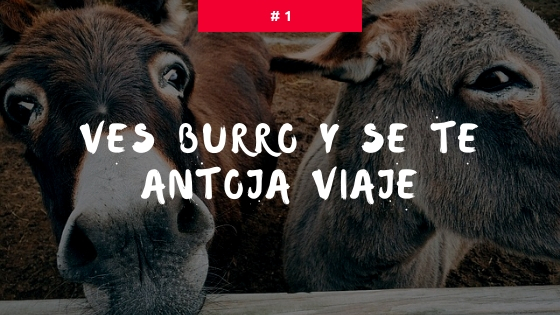
In English this literally translates to: “you see a donkey and you want a trip”.
It is a common phrase in Latin America, but it is often used in situations where one might come to the realization that they crave or want something only after seeing that someone else already has it.
Spanish dialogue:
- Friend: Tengo mucha sed voy a ir por un refresco.
- Me: Yo también tengo sed, me compras también un refresco
- Friend: Ves burro y se te antoja viaje
English dialogue:
- Friend: I’m very thirsty, I’m going to buy a soda
- Me: I’m thirsty too, Can you buy me a soda too?
Y hablando del Rey de Roma

In English this literally translates to: “talking about the king of Rome”.
In English, for example, it is translated as: Speak of the devil. And it is used when you are talking about someone and they just so happen to appear in that moment.
Spanish dialogue:
- Friend: Estoy casando del profesor de español, siempre me pone malas calificaciones.
- Me: Mira, ahí está. Hablando del rey de roma.
English dialogue:
- Friend: I’m really sick of the math teacher, he always gives me in a bad mood.
- Me: Speak of the devil.
Armar pacho

There is no a literal translation in English because “armar” is to put together and “Pancho” is a name.
In Mexico, “armar pancho” means to cause a scene, tantrum for something that a person does not like.
Spanish examples:
- Estábamos en la fiesta y mi novia me vio con otra chica y me armó un pancho.
- A mi hermano no le gustaron los juguetes que le regaló mi papá y armó un pancho.
English examples:
- We were at the party and my girlfriend saw me with another and caused a scene.
- My brother did not like the toys that my dad gave him and he had a tantrum.
Hacer de chivo los tamales
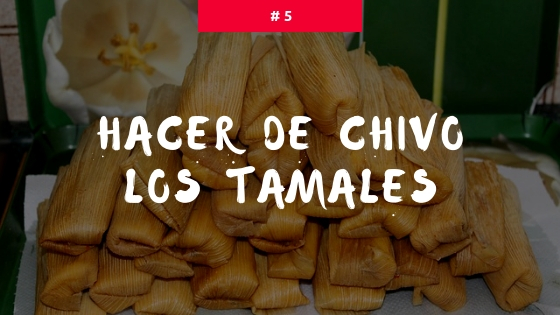
In English this literally translates to: make goat tamales. :/
But the real meaning of the phrase is: cheat or be unfaithful in a couple.
Spanish examples:
- Mi novia me hizo de chivo los tamales.
- Creo que tu esposa te hace de chivo los tamales.
English examples:
- My girlfriend is cheating on me.
- I think your wife cheats on you.
A darle que es mole de olla

In Mexico, this phrase is used to express when you want to encourage someone to do something, and without delay.
Spanish Examples:
- Mañana hay mucho trabajo.
-¡A darle que es mole de olla!
- Tengo mucha tarea.
-¡A darle que es mole de olla!
English Examples:
- Tomorrow there will be a lot of work.
-Just do it
- I have a lot of homework.
-I’m just going to do it now.
A ojo de buen cubero
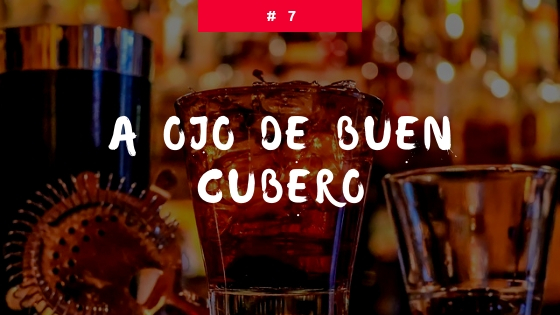
In English this literally translates to: “to the eye of a bartender”.
A “cubero” is someone who mixes drinks, and thus is very accurate in their measurements.
The phrase is used to express the measure of something or just how much approximately.
Spanish Examples:
- Quiero un poco de canela al capuchino. ¡A ojo de buen cubero!
- A ojo de buen cubero, ponle un poco de sal a mi sopa.
English Examplse:
- I want some cinnamon for my cappuccino. Just a touch will do.
- Just a touch of salt is perfect for my soup.
Ni yendo a bailar a chalma

While there is no literal translation in english it is very simple phrase to understand. It means that something has no solution.
This phrase comes from a town called “Chalma” where people go to ask for a miracle.
Spanish Dialogue:
- Friend: ¡Hola! ¿Cómo estás?
- Me: Bien.
- Friend: ¿Estudiaste para el examen?
- Me: No, ni yendo a bailar a chalma voy a pasar el examen.
English Dialogue:
- Friend: Hi! What’s up?
- Me: I’m good.
- Me: Did you study for the exam?
- Friend: No, I didn’t. Only a miracle would help me pass the test
Estar hasta las chanclas
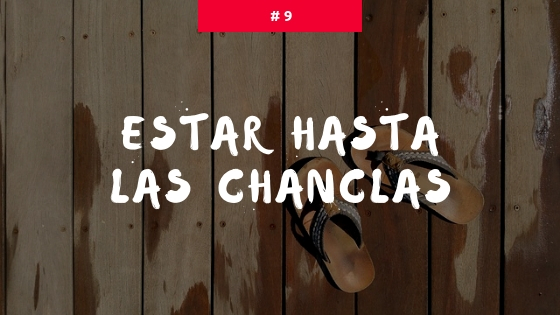
While there is no literal translation in english it is very simple phrase to understand. It means to be very drunk.
The phrase means that after the drunkenness you will be left without shoes and in flip-flops.
Spanish Examples:
- No tomes. Te vas a quedar hasta las chanclas!
- Gerardo siempre después de las fiestas está hasta las chanclas.
English Examples:
- Do not drink too much. You will end up too drunk.
- Gerardo is always so drunk after the parties.
Ya nos cayo el chahuiztle
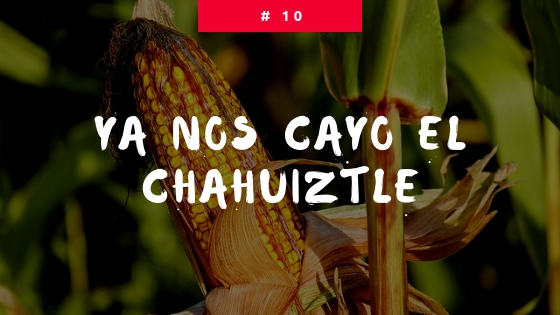
In English this literally translates to: “the chahuiztle already fell on us”, but what is chahuiztle? It is a fungus that attacks corn and that can affect its growth.
When a Mexican says that the chahuiztle fell, it is when something unexpected happens or it takes you by surprise.
Spanish Examples:
- Mi mamá llegó antes, ya nos cayó el chahuistle.
- Se me olvidó pagar mi tarjeta de credito, ya me cayó el chahuistle.
English Examples:
- My mom came before to the house by surprise.
- I forgot to pay my credit card bill and it caught me by surprise.
Perseguir la Chuleta
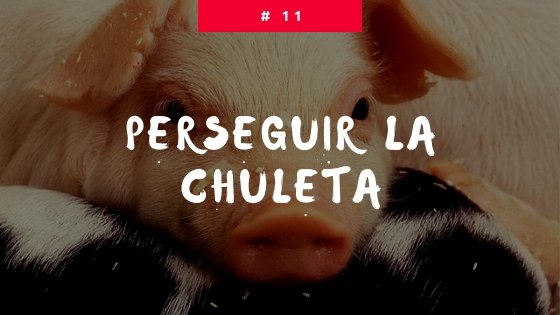
In English this literally translates to: ”pursue the chop”.
For Mexicans, it means to earn a living or work hard for something.
Spanish Examples:
- Tengo que perseguir la chuleta sino ¿de que vivo?
- Todos los días debo perseguir la chuleta
English Examples:
- I have to work so I can live
- Everyday I have to work.
Ya nos cargó el payaso

In English this literally translates to: “we’re already took care of the clown”
Mexicans use it to express something that did not go well or when is hard to find a solution.
Spanish Examples:
- Olvidé mi computadora en mi casa, ya me cargó el payaso.
- Ya me cargó el payaso, no hice mi tarea.
English Examples:
- I forgot my computer in my house. I screwed up.
- I screwed up. I didn’t do my homework.
Thanks for joining me again this week.
Recommendation
Pimsleur is one of the best programs for learning Spanish.
Get seven days free:
7-Day Free Trial then $14.95/month for full course
If you have any tips, suggestions, or comments about this article, please be sure to leave them in the comment section below.
